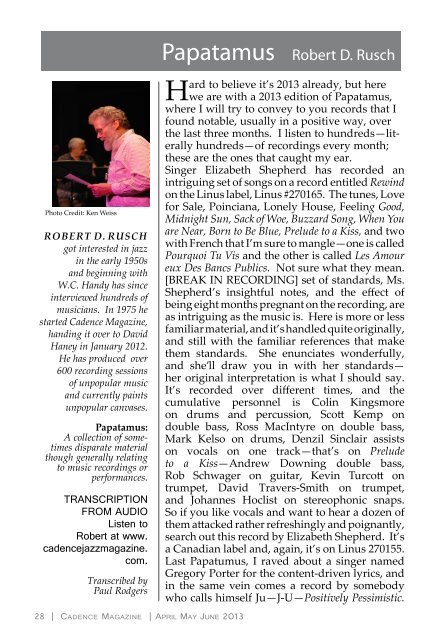Create successful ePaper yourself
Turn your PDF publications into a flip-book with our unique Google optimized e-Paper software.
Photo Credit: ken Weiss<br />
RObeRt D. Rusch<br />
got interested in jazz<br />
in the early 1950s<br />
and beginning with<br />
W.C. Handy has since<br />
interviewed hundreds of<br />
musicians. In 1975 he<br />
started Cadence Magazine,<br />
handing it over to David<br />
Haney in January 2012.<br />
He has produced over<br />
600 recording sessions<br />
of unpopular music<br />
and currently paints<br />
unpopular canvases.<br />
Papatamus:<br />
A collection of sometimes<br />
disparate material<br />
though generally relating<br />
to music recordings or<br />
performances.<br />
TranscripTion<br />
from audio<br />
listen to<br />
robert at www.<br />
cadencejazzmagazine.<br />
com.<br />
Transcribed by<br />
Paul Rodgers<br />
28 | CadenCe Magazine | april May June 2013<br />
Column Papatamus TitleRobert<br />
D. Rusch<br />
Hard to believe it’s 2013 already, but here<br />
we are with a 2013 edition of Papatamus,<br />
where I will try to convey to you records that I<br />
found notable, usually in a positive way, over<br />
the last three months. I listen to hundreds—literally<br />
hundreds—of recordings every month;<br />
these are the ones that caught my ear.<br />
Singer Elizabeth Shepherd has recorded an<br />
intriguing set of songs on a record entitled Rewind<br />
on the Linus label, Linus #270165. The tunes, Love<br />
for Sale, Poinciana, Lonely House, Feeling Good,<br />
Midnight Sun, Sack of Woe, Buzzard Song, When You<br />
are Near, Born to Be Blue, Prelude to a Kiss, and two<br />
with French that I’m sure to mangle—one is called<br />
Pourquoi Tu Vis and the other is called Les Amour<br />
eux Des Bancs Publics. Not sure what they mean.<br />
[BREAk IN RECORDING] set of standards, Ms.<br />
Shepherd’s insightful notes, and the effect of<br />
being eight months pregnant on the recording, are<br />
as intriguing as the music is. Here is more or less<br />
familiar material, and it’s handled quite originally,<br />
and still with the familiar references that make<br />
them standards. She enunciates wonderfully,<br />
and she’ll draw you in with her standards—<br />
her original interpretation is what I should say.<br />
It’s recorded over different times, and the<br />
cumulative personnel is Colin kingsmore<br />
on drums and percussion, Scott Kemp on<br />
double bass, Ross MacIntyre on double bass,<br />
Mark kelso on drums, Denzil Sinclair assists<br />
on vocals on one track—that’s on Prelude<br />
to a Kiss—Andrew Downing double bass,<br />
Rob Schwager on guitar, Kevin Turcott on<br />
trumpet, David Travers-Smith on trumpet,<br />
and Johannes Hoclist on stereophonic snaps.<br />
So if you like vocals and want to hear a dozen of<br />
them attacked rather refreshingly and poignantly,<br />
search out this record by Elizabeth Shepherd. It’s<br />
a Canadian label and, again, it’s on Linus 270155.<br />
Last Papatumus, I raved about a singer named<br />
Gregory Porter for the content-driven lyrics, and<br />
in the same vein comes a record by somebody<br />
who calls himself Ju—J-U—Positively Pessimistic.


